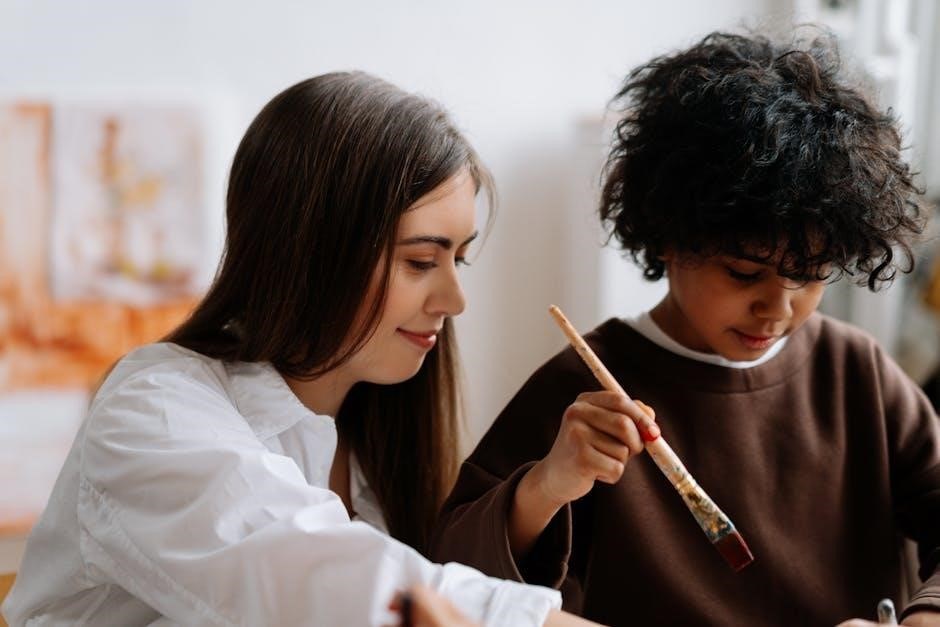Personal project tutorials guide students through the MYP personal project, offering step-by-step advice and resources to help them explore interests and develop essential skills independently․
1․1․ Overview of Personal Projects
A personal project is an independent, self-directed inquiry that allows students to explore a topic of personal interest․ It is a key component of the MYP program, fostering critical thinking, creativity, and self-management skills․ The project culminates in a final product, such as a physical artifact, digital creation, or service, accompanied by a reflective report․ Students are encouraged to apply prior knowledge and skills, demonstrating their growth as IB learners․ The process journal documents their journey, showcasing progress and learning․
1․2․ Purpose of the Guide
This guide is designed to assist students in completing their personal projects effectively․ It provides a structured approach, offering step-by-step guidance, resources, and examples to help students navigate the MYP personal project process․ The guide clarifies expectations, outlines key requirements, and offers practical advice to ensure students produce high-quality work․ It aims to empower students with the knowledge and confidence needed to manage their projects independently while aligning with the IB’s rigorous standards and fostering meaningful learning experiences․
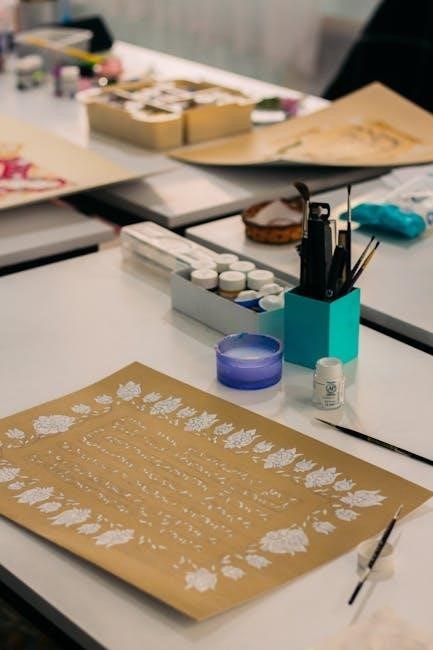
Understanding the MYP Personal Project
The MYP Personal Project is a self-driven inquiry where students explore personal interests, develop skills, and create a product, process journal, and report, fostering IB learner outcomes․
2․1․ Nature of MYP Projects
MYP projects are independent, self-directed inquiries that allow students to explore personal interests․ They involve critical thinking, creativity, and the application of skills learned in the classroom․ These projects are not limited to academic subjects but can encompass a wide range of areas, including arts, sciences, and community service․ The process encourages students to take ownership of their learning, develop problem-solving abilities, and reflect on their experiences․ This approach aligns with the IB learner profile, fostering independence and intellectual curiosity․
2․2․ Specific Features of the Personal Project
The personal project is a student-led, independent inquiry that allows learners to explore a topic of personal interest․ It requires the development of a product, a process journal, and a reflective report․ The project emphasizes the application of Approaches to Learning (ATL) skills, such as self-management, research, and critical thinking․ Students are expected to demonstrate initiative, creativity, and responsibility throughout the process․ The project culminates in a final product that showcases their learning and skills, aligning with the IB learner profile․
2․3․ Culminating Experiences in the IB Continuum
The personal project serves as a culminating experience in the IB Middle Years Programme (MYP), bridging the Primary Years Programme (PYP) and Diploma Programme (DP)․ It synthesizes skills and concepts learned throughout the MYP, preparing students for future academic challenges․ The project reflects the IB learner profile, emphasizing critical thinking, creativity, and self-directed learning․ It also aligns with Approaches to Learning (ATL) skills, fostering independence and intellectual curiosity․ This experience is a cornerstone of the IB continuum, showcasing student growth and readiness for advanced studies․
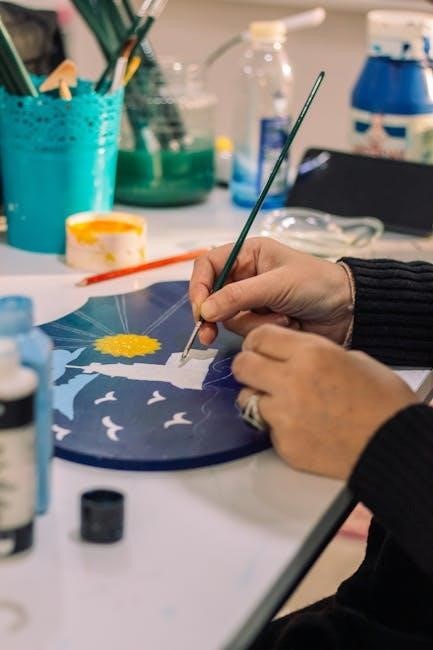
Aims and Objectives of the Personal Project
The personal project aims to enable students to explore personal interests and apply skills․ Its objectives are to develop critical thinking, creativity, and self-management skills, reflecting IB learner attributes effectively․
3․1․ Aims of the Personal Project
The aims of the personal project are to provide students with the opportunity to explore personal interests, develop essential skills, and demonstrate their understanding of IB learner attributes․ It encourages independent learning, critical thinking, and creativity, while fostering self-management and reflection․ The project aims to prepare students for further education and life beyond academia by enhancing their ability to apply knowledge and skills in real-world contexts․ Additionally, it promotes personal growth and the development of a lifelong love for learning․
3․2․ Objectives of the Personal Project
The objectives of the personal project are to enable students to conduct independent inquiries, apply prior knowledge, and develop ATL skills such as research, communication, and critical thinking․ It aims to help students produce a high-quality product and a reflective report, showcasing their learning journey․ Additionally, the project seeks to prepare students for future academic challenges by fostering time management, self-directed learning, and the ability to receive and act on feedback, aligning with IB learner profile attributes and fostering a growth mindset․

Requirements and Expectations
The personal project requires approximately 25 hours of independent learning, including supervisor meetings․ Students must demonstrate self-management, research, and communication skills, aligning with IB expectations and ATL development․
4․1․ Time Commitment and Independent Learning
The personal project requires a significant time commitment, with students expected to dedicate approximately 25 hours to the entire process․ This includes independent learning, research, and meetings with supervisors․
Independent learning is a key aspect, as students are responsible for managing their time effectively and staying self-motivated․ The process journal serves as a tool to track progress and reflect on learning experiences․
Students are encouraged to develop self-management skills, ensuring they meet deadlines and maintain consistent effort throughout the project․ Regular updates and reflections in the process journal are essential for accountability and growth․
4․2․ Role of the Supervisor
The supervisor plays a crucial role in guiding students through their personal project, providing feedback and ensuring they meet the project’s expectations․ They help students understand the requirements and offer support in developing their ideas․ Supervisors monitor progress, provide constructive criticism, and assist in overcoming challenges․ However, the primary responsibility for the project lies with the student, as the supervisor acts as a facilitator rather than a director․ Regular meetings and open communication are essential for a successful working relationship․

Organizing Your Personal Project
Organizing your personal project involves effective time management, self-management, and communication skills․ It requires balancing tasks, setting deadlines, and maintaining a process journal to track progress and reflect on learning․
5․1․ Time Management and Self-Management Skills
Effective time management and self-management are crucial for the success of your personal project․ Create a detailed schedule to allocate time for research, planning, and execution․ Prioritize tasks to ensure steady progress and avoid last-minute rushes․ Regularly reflect on your progress and adjust your timeline as needed․ Self-management involves staying disciplined, meeting deadlines, and maintaining accountability․ By mastering these skills, you can efficiently balance independent learning with collaboration, ensuring the project aligns with your goals and expectations while demonstrating ATL skills like self-management and organization․
5․2․ Developing Communication Skills
Developing communication skills is vital for the personal project, as it involves expressing ideas clearly and effectively․ Practice articulating your thoughts through verbal, written, and visual formats․ Use tools like process journals and reports to document progress and reflect on interactions․ Engage in discussions with supervisors and peers to refine your communication strategies․ This skill enhances clarity, confidence, and the ability to convey complex ideas effectively, ensuring your project’s message is understood and appreciated by others․
5․3․ Applying ATL Skills
Applying Approaches to Learning (ATL) skills is central to the personal project․ These include self-management, research, critical thinking, and collaboration․ Utilize these skills to plan effectively, conduct thorough research, and reflect on your progress․ ATL skills foster independence, creativity, and problem-solving abilities, enabling you to navigate challenges and produce a high-quality final product․ By integrating these skills, you demonstrate your growth as an IB learner and enhance the overall quality of your project․
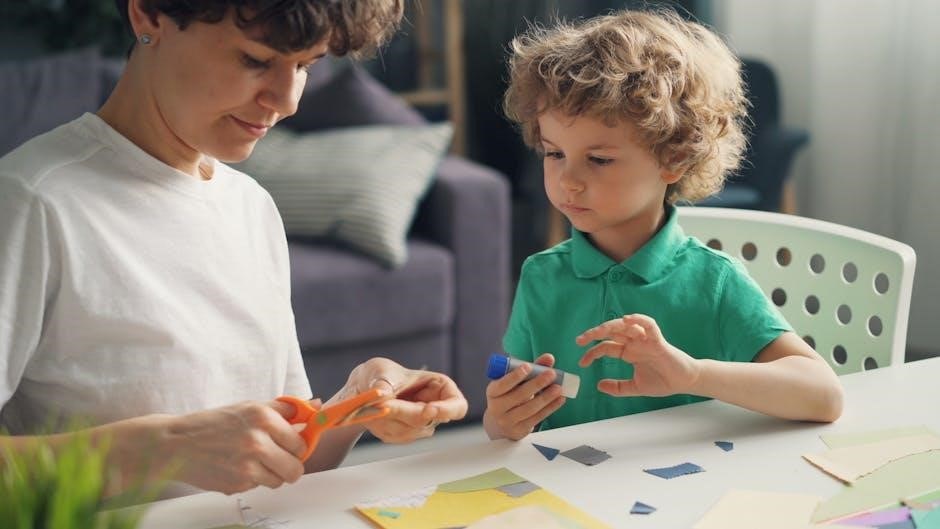
The Process Journal
The process journal documents your personal project journey, recording progress, reflections, and challenges․ It provides evidence of your learning and development throughout the project․
6․1․ What is a Process Journal?
A process journal is a detailed record documenting your personal project journey, capturing reflections, decisions, challenges, and progress․ It serves as evidence of your learning, showcasing how you applied skills like research, critical thinking, and self-management․ Regular entries demonstrate your engagement and growth, providing insights into your problem-solving strategies and creative processes․ The journal is a key component of the personal project, illustrating your development as an IB learner and your ability to reflect on your experiences․
6․2․ How to Maintain a Process Journal
To maintain a process journal, establish a routine for regular updates, reflecting on your progress, challenges, and decisions․ Document your thoughts, questions, and insights, ensuring clarity and organization․ Include evidence of skill application, such as critical thinking or collaboration․ Review and edit entries periodically to refine your reflections․ Use clear headings and dates to track your journey․ The journal should evolve naturally, capturing your growth and learning throughout the personal project․
6․3․ Examples of Process Journal Entries
Example entries might include reflections on initial ideas and research, challenges faced, and strategies for overcoming them․ One entry could detail a breakthrough in understanding, while another might document a setback and lessons learned․ Entries should capture progress, skill development, and personal growth, providing a comprehensive record of the project journey․ Regular updates ensure continuity, while specific examples illustrate the application of ATL skills and IB learner profiles throughout the process․
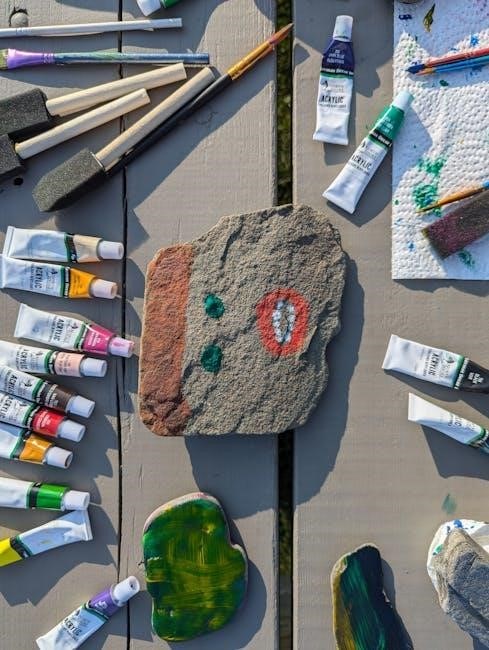
The Final Product and Report
The final product is the tangible outcome of your project, while the reflective report provides a detailed account of your journey, challenges, and learning․ Together, they showcase your skills and understanding․
7․1․ Developing the Final Product
Developing the final product involves refining your project’s outcome, ensuring it aligns with your goals and objectives․ This stage requires creativity, technical skills, and attention to detail․ Whether it’s a physical artifact, digital creation, or innovative solution, the product should reflect your personal interest and learning journey․ Regular feedback from your supervisor and peers can help enhance the quality and relevance of your final output, making it a meaningful culmination of your efforts․
7․2․ Writing the Reflective Report
Writing the reflective report is a critical component of the personal project, allowing you to articulate your learning journey and the skills you’ve developed․ The report should include reflections on your process, challenges faced, and how you applied ATL skills․ It also provides an opportunity to evaluate your final product and discuss how it addresses your initial goals․ A well-structured report demonstrates self-awareness, critical thinking, and the ability to communicate your experiences effectively․

Presentation and Feedback
The presentation and feedback session allows students to showcase their final product and reflect on their journey, receiving constructive criticism to refine their work further․
8․1; Preparing for the Presentation
Preparing for the presentation involves organizing key points, practicing delivery, and creating visual aids to showcase the final product․ Students should reflect on their process, highlighting challenges and learning․ Clarity and confidence are essential to effectively communicate goals and development․ Practicing in front of peers or supervisors can help refine the presentation, ensuring it aligns with the project’s objectives and demonstrates understanding of the inquiry cycle․ This step ensures students are ready to articulate their journey and outcomes clearly and persuasively․
8․2․ Receiving and Acting on Feedback
Receiving feedback is a crucial part of the personal project journey, allowing students to refine their work and improve outcomes․ Students should remain open-minded and proactive in seeking input from supervisors, peers, and mentors․ Feedback should be analyzed to identify areas for improvement and guide revisions․ Reflecting on feedback demonstrates growth and understanding, while documenting it in the process journal shows how it has been incorporated into the final product․ This step fosters resilience, adaptability, and a deeper understanding of the project’s objectives․
Examples and Case Studies
Examples and case studies provide insights into successful personal projects, showcasing challenges overcome and practical insights, helping students gain inspiration and guidance for their own projects․
9․1․ Successful Personal Project Examples
Successful personal projects often involve students exploring personal interests, such as developing apps, creating documentaries, or designing innovative solutions․ These examples highlight skills like critical thinking, creativity, and self-management․ For instance, a student might create a website to address a community issue or develop a sustainable product․ Such projects demonstrate how learners can apply knowledge from various subjects to real-world challenges․ These examples inspire others by showcasing the potential of self-driven inquiry and the development of essential IB learner skills․ They serve as motivation and practical guides for students embarking on their own projects․
9․2․ Learning from Case Studies
Learning from case studies provides valuable insights into successful personal projects, helping students understand effective strategies and common challenges․ By analyzing real-life examples, learners can identify best practices, such as time management, resource allocation, and problem-solving techniques․ Case studies also highlight how students applied ATL skills and demonstrated IB learner profiles in their projects․ These practical lessons enable students to refine their approaches, avoid pitfalls, and develop a deeper understanding of what makes a personal project successful and impactful․

Resources and Tools
Utilize recommended tools for project management, online tutorials, and guides to effectively plan, organize, and execute your personal project, ensuring successful completion and high-quality outcomes․
10․1․ Recommended Tools for Project Management
Effective project management is crucial for the success of your personal project․ Tools like Trello and Asana help organize tasks and track progress, while Microsoft Teams and Google Workspace facilitate collaboration and communication․ For coding projects, GitHub is ideal for version control and sharing work․ MindMeister aids in brainstorming and mind mapping, and HelpNDoc simplifies documentation․ These tools enable efficient planning, execution, and documentation, ensuring you stay on track and achieve your project goals effectively․
10․2․ Online Tutorials and Guides
Various online tutorials and guides are available to support your personal project journey․ Platforms like YouTube offer video tutorials on specific skills, while websites like GitHub provide step-by-step guides for coding projects․ Tools like HelpNDoc and MindMeister offer resources for documentation and mind mapping․ Additionally, the International Baccalaureate provides official guides and resources to help students navigate the MYP personal project․ These resources are designed to offer guidance, inspiration, and practical advice, ensuring you have the support needed to excel in your project․

Best Practices for Success
Stay organized, set clear goals, and reflect regularly․ Seek feedback, maintain motivation, and avoid procrastination to ensure successful project completion and personal growth․
11․1․ Staying Motivated Throughout the Project
Staying motivated is key to successfully completing your personal project․ Break your project into smaller, manageable tasks to maintain momentum and celebrate progress․ Setting clear, achievable goals helps build confidence and keeps you focused․ Regular reflection and self-assessment can also boost motivation by highlighting accomplishments and growth․ Engaging with peers, sharing ideas, and seeking feedback fosters a sense of community and accountability, which can further drive enthusiasm and commitment to your project․
11․2․ Avoiding Common Mistakes
Avoiding common mistakes is crucial for the success of your personal project․ One major pitfall is procrastination, which can derail timelines and reduce the quality of your work․ To prevent this, establish a structured schedule and adhere to deadlines․ Additionally, clearly define your project’s scope to avoid overwhelming yourself with unnecessary complexities․ Regularly reviewing your progress and seeking feedback from supervisors can help identify and address issues early, ensuring your project remains on track and aligned with its objectives․
Completing your personal project is a significant achievement, showcasing your skills and growth․ Use this experience to inspire future endeavors and continue exploring your passions with confidence․
12․1․ Final Thoughts on Completing the Personal Project
Completing the personal project marks a significant milestone, reflecting your dedication and growth․ Embrace the skills and confidence gained, as these will serve as a strong foundation for future challenges․ Remember, the process is as valuable as the product, and the experience will continue to inspire personal and academic development․ Be proud of your achievement and use it as motivation for ongoing learning and exploration․ Celebrate your success and the journey undertaken to reach this point․
12․2․ Encouragement for Future Projects
Completing your personal project is a testament to your perseverance and creativity․ Use this experience as a springboard for future endeavors, applying the skills and confidence gained․ Embrace new challenges with enthusiasm, knowing that each project is an opportunity for growth․ Stay curious, remain motivated, and continue exploring your passions․ The lessons learned here will guide you in tackling more complex tasks and pursuing innovative ideas with confidence and determination․
